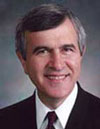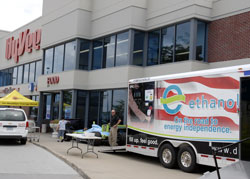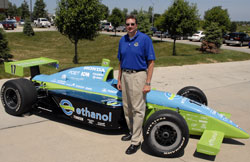 Jim Sturdevant has joined POET as its new director in POET’s partnership with the U.S. Department of Energy to build a commercial cellulosic ethanol production facility.
Jim Sturdevant has joined POET as its new director in POET’s partnership with the U.S. Department of Energy to build a commercial cellulosic ethanol production facility.
According to this POET press release, Sturdevant joins POET’s Project LIBERTY after 28 years at EROS in Sioux Falls, the last 22 of which were spent with the U.S. Geological Survey:
As director of Project LIBERTY, Sturdevant will coordinate all efforts within POET to commercialize cellulosic ethanol. Jeff Broin, CEO of POET, said, “Due to the importance of this project to the future of POET, it is vital to have someone with Jim’s leadership abilities to facilitate collaboration and communication across the organization. There’s hardly a person at POET that isn’t involved in this project and Jim will make sure they’re all reading from the same book.”
The POET cellulosic project gets joint funding from the Department of Energy to convert an existing corn ethanol plant in Emmetsburg, Iowa into a commercial cellulosic biorefinery. The plant will be able to produce 100 million gallons of ethanol a year from corn and 25 million from corn fiber and corn cobs. This will boost a bushel of corn’s ethanol potential by 11 percent, get 27 percent more ethanol from an acre of corn, while decreasing the amount of water used in ethanol refining by 24 percent.


 The National Biodiesel Board (NBB) applauded the action in
The National Biodiesel Board (NBB) applauded the action in 
 * Extension of the biodiesel tax incentive through 2010. The provision is based on legislation introduced this year by Representatives Earl Pomeroy (D-ND) and Kenny Hulshof (R-MO).
* Extension of the biodiesel tax incentive through 2010. The provision is based on legislation introduced this year by Representatives Earl Pomeroy (D-ND) and Kenny Hulshof (R-MO). The
The  Agriculture Secretary Mike Johanns is disappointed with the 2007 Farm Bill he sees developing in the House Agriculture Committee for a number of reasons. One of them is lack of funding for cellulosic ethanol research.
Agriculture Secretary Mike Johanns is disappointed with the 2007 Farm Bill he sees developing in the House Agriculture Committee for a number of reasons. One of them is lack of funding for cellulosic ethanol research. Encouraging development of cellulosic ethanol is one of the main goals of the bi-partisan
Encouraging development of cellulosic ethanol is one of the main goals of the bi-partisan  Congressman Putnam said, “By jumpstarting the research and development on cellulosic ethanol, we think it can play a tremendous role in adding value to existing agricultural commodities.”
Congressman Putnam said, “By jumpstarting the research and development on cellulosic ethanol, we think it can play a tremendous role in adding value to existing agricultural commodities.” 
 Craig Floss is the CEO of the
Craig Floss is the CEO of the  Jeff Simmons, driver of the #17 Ethanol car for Rahal-Letterman Racing got his first laps on this track this afternoon.
Jeff Simmons, driver of the #17 Ethanol car for Rahal-Letterman Racing got his first laps on this track this afternoon.